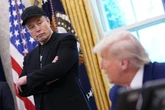Presidential candidate Donald Trump said at the 2024 Republican National Convention that he plans to immediately end the electric vehicle (EV) mandate on the first day of his second term. Fast forward a few weeks and Trump’s tone has softened following an endorsement by Elon Musk—which was evident in the recent two-hour-long conversation the two men had on social platform X.
As a businessman, I like to follow the most lucrative path when I’m navigating mixed signals— an approach I’m sure major business tycoons like Donald Trump and Elon Musk would agree with. Which one is that, you ask?
Embracing and advancing EV adoption.
What EVs bring the economy
The Industrial Revolution following the invention of the first automobile led to the development of better roads and transportation. This created a near instant demand for new industries, new economies, and jobs to supply the demand for automobile parts and fuel. Now, with the advent of EVs, a new electrical revolution has begun, and we are seeing the same explosion in innovation, technology, and jobs in the EV sector and the industries that support it.
Within the semiconductor industry alone—a sector that EVs rely upon heavily—there is a current projected shortage of 67,000 workers, within manufacturing, engineering, and technology, and a broader gap of 1.4 million by 2030. This is just one part of the many employment opportunities EVs will provide. President Biden also recently awarded eight states with $1.7 billion in grants to boost electric vehicle manufacturing and assembly which is set to create or retain thousands of union jobs in auto-based communities.
Besides job creation, the EV revolution will also bring significant workforce advancement. Employees in gas stations, auto body shops, and automotive accessory retailers will learn more about software, tech, and computer science leading to broader knowledge and better pay for those working in the automotive industry. Job expansion and advanced skill sets across the country will also give us a competitive edge with Europe and Asia.
The benefit to states
Multiple states in the U.S. are currently facing an EV renaissance of their own. Electric vehicles have become central to the Senate race in Michigan, a thriving hub for manufacturing and the automotive industry. In this race, bipartisan support of tax credits to EV consumers and manufacturers will be critical to support domestic EV manufacturing, especially with the intense global competition we face on that front. And Michigan—home to the three major U.S. automakers and where of all U.S. auto production occurred in 2022—could be the backbone of that EV revolution, creating thousands of jobs for Michiganders.
The same goes for Wisconsin, home of the 2024 RNC. Manufacturing accounts for 57.95% of the state’s real GDP—more than any other economic sector, according to data from the U.S. Bureau of Economic Analysis. As such, there is great potential for producing EVs and EV parts across the state, which will contribute significantly to the state economy through continued job creation and advancement of workforce expertise.
Separately, Wisconsin is also investing in its EV infrastructure. As of May 2024, the Wisconsin Department of Transportation awarded $23.3 million to 53 locations statewide (such as gas stations, hotels, and grocery stores) as a part of the Wisconsin Electric Vehicle Infrastructure Program. Such economic investment will only result in more jobs, while simultaneously, positioning the U.S. to lead the EV race globally.
In North Carolina, Governor Roy Cooper is jumping into the race, touting his state’s adoption of electric vehicles. He said the Tar Heel state surpassed their initial EV registration two years ahead of schedule, and pushed the need to quickly build up the state’s charging infrastructure. The rapid adoption in North Carolina also prompted Cooper’s new goal of 1.25 million EVs on the road by 2030.
Red, blue, and purple support
Be it swing states, or those majorly leaning red or blue, demand for EVs is seeing wide bipartisan support. Why? Because the math makes sense—coupling profits with fighting the climate crisis is a win for everyone. California tops the list of states with registered EVs, with 1,178,948 cars on the road. Texas and Florida come in second and third in the EV race.
No matter who wins the presidency this November, EV adoption presents a huge bipartisan opportunity for economic growth, innovation, jobs, sustainability, and—let’s face it—some really cool cars on the road. That is something Republicans and Democrats should both agree on.
Hooman Shahidi is the co-founder and CEO of EVPassport.









No comments